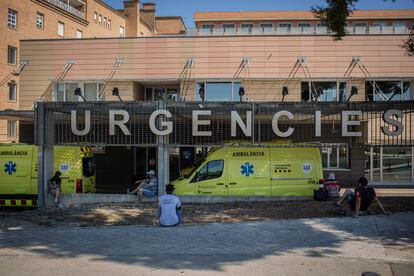Coronavirus outbreak reveals shortcomings of Catalonia’s contact tracing system
Healthcare workers complain about a shortage of human resources and computer glitches as the number of positive cases continues to rise

A large coronavirus outbreak in the Catalan province of Lleida has caught the regional government off-balance. As authorities struggle to deal with the biggest Covid-19 crisis in Spain since the state of alarm was lifted in June, healthcare sources are warning that the contact tracing system is not fully functional due to insufficient human and technical resources.
The promised reinforcements for the epidemiological monitoring network have been slow to show up, and a computer system created specifically to help fight the spread of the virus has been hampered by recurring glitches, said these sources.
“In one of every five cases, we don’t know how the patient contracted the virus,” notes José Luis Morales-Rull, who heads the coronavirus unit at Arnau de Vilanova hospital in Lleida.
Meanwhile, the new surge in cases is straining the hospital system once again. So far there are 68 hospitalized coronavirus patients, of whom eight are in intensive care. On Tuesday, 74 new cases brought the total number of infections in the comarca of Segrià – a traditional administrative division that comprises 38 municipalities– to more than 500. Extraordinary measures are being reintroduced, such as setting up a field hospital and recruiting volunteers from other parts of Catalonia.
In one of every five cases, we don’t know how the patient contracted the virusJosé Luis Morales-Rull, Arnau de Vilanova Hospital
Catalan authorities have reintroduced restriction of movement in Segrià, an area of Lleida province that includes the provincial capital and which is home to over 200,000 people. Although residents may still come and go within this area, the government is considering the possibility of confining people to their homes if the situation does not improve in the coming days.
“The system is starting to feel a lot of strain,” said Ramon Sentís, manager of the Catalan Health Institute in Lleida. “The Arnau de Vilanova [hospital] has dedicated two floors to Covid-19 and the private centers have no more room. It’s not just a problem of space, but also of personnel. There could be saturation problems within 48 hours, and if that happens, we should consider options such as sending patients to other health areas,” he said, alluding to the possibility of transferring patients to hospitals in other parts of Catalonia.
Adrià Comella, the head of the Catalan Health Service (CatSalut), was in Lleida on Tuesday and confirmed that the regional government is studying ways to boost staff numbers at the city’s hospitals with healthcare workers from other parts of Catalonia. Comella said that patient transfers are also under consideration.

Spain, one of the countries to be worst hit by the Covid-19 pandemic, emerged from a staggered deescalation process on June 21 after a prolonged lockdown that began in mid-March. In order to progress through the stages of deescalation, regional governments were asked to show the Spanish Health Ministry their plans to deal with any future outbreaks. These plans had to include robust monitoring systems to trace cases quickly and efficiently.
Catalonia’s plan included boosting these systems with over 100 professionals, and outsourcing administrative tasks related to contact tracing to a call center operated by the infrastructure multinational Ferrovial and manned by 230 employees. The plan also promised to create a computer platform named Mediator that would serve as the backbone for all other computer-based coronavirus assistance systems.
Normally, Lleida’s epidemiology monitoring service comprises nine workers, four of whom are experienced epidemiologists. Coronavirus cases began to surge in the province three weeks ago, yet reinforcements did not show up until now. The new recruits are two administrative workers, two medical residents, one medical student and one computer expert.
A Catalan government spokesperson said that this group will be expanded to reach 25 additional workers in the coming days, and that hiring is already underway for 70% of the promised professionals. The government is blaming administrative paperwork for slowing down the procedure.
It was a strategic mistake to create something new that is now suffering from the typical problems of untested thingsAnonymous healthcare worker
Healthcare workers consulted by this newspaper have also complained about problems with the Mediator computer system. Primary healthcare physicians are already working with another program called eCAP that helps them complete a patient’s history.
“The plan was that every time a doctor dealt with a positive case and asked about his or her contacts, this information would be fed to eCAP and the latter would transfer the data to Mediator. But it’s not working,” said sources in Lleida’s primary healthcare system.
The data was then supposed to arrive at the call center so workers there could start locating the contacts. “For some reason [the information] is not arriving. Either the doctors are not typing in the patients’ contacts, or there is some other problem,” said a professional with ties to the call center.
A month ago, the call center was at the heart of a bitter public dispute in Catalonia after it emerged that the government had awarded the €17.6 million contract to Ferrovial without a tender, using the emergency powers granted by the state of alarm. The Catalan government pledged at the time to rescind the contract when Spain entered the “new normality,” but a Ferrovial spokesperson said on Tuesday that the company has received “no formal communication” from the regional authorities regarding the matter.
Healthcare sources said they are afraid that these problems will continue to undermine the fight against the Lleida outbreak. “It’s always better to build on something that already works and to reinforce structures that already have the knowledge and the experience. It was a strategic mistake to create something new that is now suffering from the typical problems of untested things,” said one source.
These workers are also wondering why authorities did not adopt prevention measures ahead of the arrival of seasonal laborers for the peak of the fruit picking season. “Every year there are close to 30,000 people who show up, and we know that many of them live in precarious conditions,” said a healthcare worker. “The virus had never stopped circulating, so it was to be expected that something like this would happen if the monitoring system was not reinforced and specific plans adopted.”
English version by Susana Urra.
Tu suscripción se está usando en otro dispositivo
¿Quieres añadir otro usuario a tu suscripción?
Si continúas leyendo en este dispositivo, no se podrá leer en el otro.
FlechaTu suscripción se está usando en otro dispositivo y solo puedes acceder a EL PAÍS desde un dispositivo a la vez.
Si quieres compartir tu cuenta, cambia tu suscripción a la modalidad Premium, así podrás añadir otro usuario. Cada uno accederá con su propia cuenta de email, lo que os permitirá personalizar vuestra experiencia en EL PAÍS.
¿Tienes una suscripción de empresa? Accede aquí para contratar más cuentas.
En el caso de no saber quién está usando tu cuenta, te recomendamos cambiar tu contraseña aquí.
Si decides continuar compartiendo tu cuenta, este mensaje se mostrará en tu dispositivo y en el de la otra persona que está usando tu cuenta de forma indefinida, afectando a tu experiencia de lectura. Puedes consultar aquí los términos y condiciones de la suscripción digital.








































